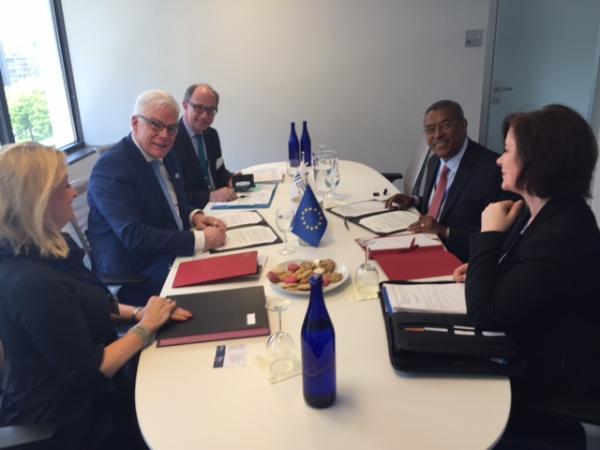
Working to build greater prosperity for disadvantaged and vulnerable rural people in developing countries around the world, the European Investment Bank (EIB) and the International Fund for Agricultural Development (IFAD) signed an agreement today to reinforce and expand cooperation between the two organisations.
The Memorandum of Understanding was signed by EIB’s Vice-President, Pim van Ballekom, and IFAD’s Associate Vice President, Henock Kifle, in the margins of the International Monetary Fund and the World Bank Group Spring Meetings in Washington DC.
The agreement reflects the shared focus of IFAD and EIB on developing agribusiness and creating jobs and prosperity in the countries where the two organisations both operate. In the context of recent international agreements such as the Sustainable Development Goals and the Paris Agreement on climate change, the partnership will focus on investments in agriculture which will result in sustainable and inclusive economic growth and continued food supplies for a growing population.
Through this partnership, the two organisations aim to share knowledge, implement joint projects and provide financial instruments, such as loans and guarantees, to better channel crucial financing to help smallholder farmers maximise their potential.
Pim van Ballekom, EIB Vice-President, said: “Agriculture and agribusiness play a very important role throughout the world, especially in developing and emerging economies, as these sectors are huge employers and key to social issues such as livelihoods and food security. They have the ability to create more jobs and to further drive growth in a sustainable manner. But to achieve this, they need the correct approach to investment, as well as sufficient funding. They deserve our full attention and support and this is where the EIB and IFAD can make a real impact.”
“IFAD and EIB share a common belief in the importance of investing in smallholder famers and in developing rural areas. Through the Sustainable Development Goals, the world has envisioned an inspiring future. By sharing our knowledge and working together, our two organisations can make a real contribution to ending hunger, achieving food security and ensuring that agriculture is a sustainable business.” added Associate Vice-President Henock Kifle of IFAD.
Background information:
The European Investment Bank (EIB) is the long-term lending institution of the European Union owned by its Member States. It makes long-term finance available for sound investment in order to contribute towards EU policy goals. As the world’s largest multilateral lender and climate financier, the EIB is helping to tackle climate change. Last year 27% of all lending went towards climate action, through the EIB’s Climate Strategy.
The EIB is active in 160 countries around the world. As a key player in the world of development finance, the European Investment Bank (EIB) is participating in the 2016 Spring Meetings of the World Bank Group and the International Monetary Fund (IMF) taking place in Washington D.C. (USA) through a delegation led by President Werner Hoyer. These events are among the most important in the calendars of all organisations involved in international development and the EIB is proud to contribute its expertise.
As the EU bank, the EIB provides long-term finance for sound, sustainable investment projects in support of EU policy goals in Europe and beyond including the Sustainable Development Goals and putting the Paris Agreement on Climate Change We are the largest multilateral lender and borrower in the world and are owned by the EU’s 28 member states. The EIB makes long-term finance available for sound investment in order to contribute towards EU policy goals including the support of the Sustainable Development Goals and putting the Paris Agreement on Climate Change into practice.
The EIB invests in four priority areas in support of growth and job creation: innovation and skills; access to finance; climate action and environment; and strategic infrastructure.
As the world’s largest climate financier, the EIB is playing a particularly important role in helping to tackle climate change. Last year around 27% of all lending went towards climate action. The Bank is committed to raising the proportion of climate investment to 35% by 2020, and placing a greater emphasis on helping regions in the frontline of climate change to adapt.
For more information
Tackling Global Challenges Together: for updates, news and videos www.eib.org/globalcooperation
The International Fund for Agricultural Development (IFAD) is an international financial institution and a specialized United Nations agency. It invests in rural people, empowering them to reduce poverty, increase food security, improve nutrition and strengthen resilience. Since 1978, IFAD has provided US$17.6 billion in grants and low-interest loans to projects that have reached about 459 million people.

Photographer: EIB ©To be defined
Download original

Photographer: EIB ©To be defined
Download original

Photographer: EIB ©To be defined
Download original